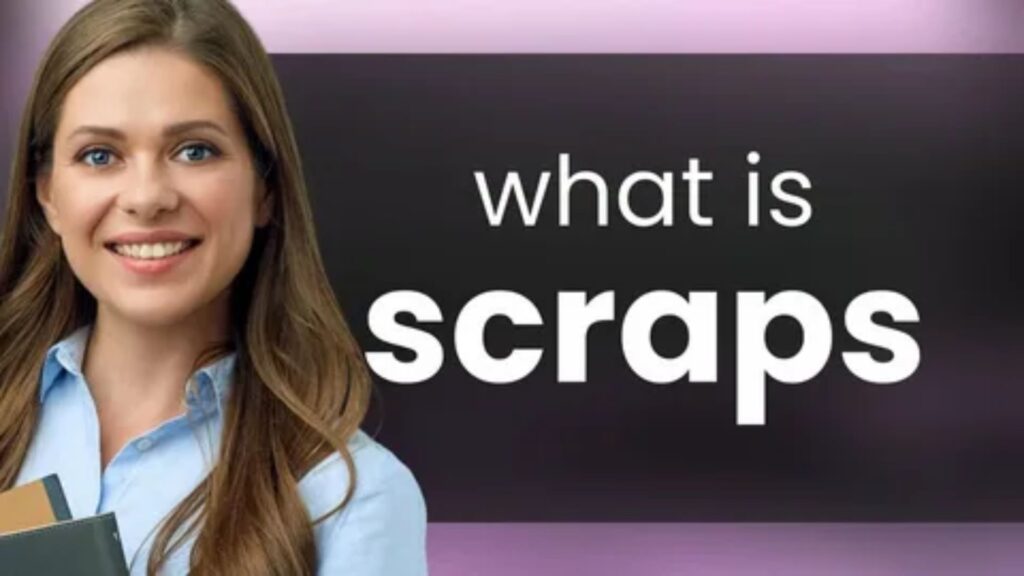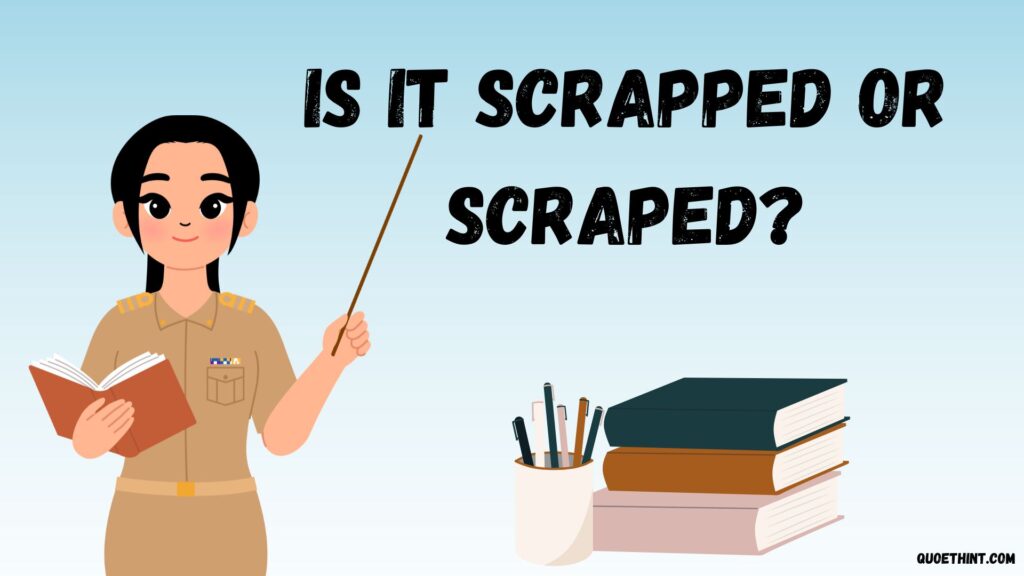English has its fair share of word confusion, and one of the sneakiest pairs is scrapped and scraped. At first glance, these two words look nearly identical. They’re also both past tense verbs that describe actions. No wonder they’re often swapped mistakenly in writing.
The problem is, the meanings differ completely. One belongs to the world of discarding ideas or projects, while the other is all about removing or rubbing surfaces. To clear things up, let’s break down the difference between scrapped vs scraped, see how they’re used in sentences, and explore their fascinating origins.
Scrapped Meaning: When Plans Are Abandoned

The verb scrap means to discard, abandon, or eliminate something that is no longer useful. Its past tense, scrapped, often appears in business, organizational, or project-based contexts.
Think of scrapped as the action you take when you cancel plans, ditch a project, or drop an idea.
Examples of “Scrapped” in Context
- Business scenario (email):
Subject: Update on the Website Redesign Project
Hi Karen,
After reviewing the budget and timeline, the management team has decided that the website redesign project has been scrapped. We’ll focus instead on improving the current platform.
Best,
Daniel - Everyday scenario:
“We had big plans to travel across Europe this summer, but due to unexpected expenses, the trip was scrapped.” - Education scenario:
“The professor initially planned a group project, but after several complaints, he scrapped the idea and gave us individual assignments instead.”
Synonyms for Scrapped
- Discarded
- Cancelled
- Abandoned
- Jettisoned
- Dropped
- Discontinued
Whenever you see scrapped project or scrapped plan, it signals something has been deliberately put aside or eliminated.
Scraped Meaning: Surfaces, Injuries, and Effort
On the other hand, scrape means to scratch, rub, or remove a surface layer of something. The past tense, scraped, usually involves physical actions or figurative struggles.
You might scrape ice off your windshield, scrape mud from your shoes, or scrape through an exam by the skin of your teeth.
Examples of “Scraped” in Context
- Everyday action (email):
Subject: Maintenance Report
Hi Oliver,
I scraped the old paint off the metal railing as requested. It’s ready for a fresh coat tomorrow.
Regards,
Steven - Health scenario:
“Lucy fell off her bike and scraped her knee on the pavement.” - Education scenario:
“I didn’t study as much as I should have, but somehow, I scraped through the exam.” - Cleaning scenario:
“Mark scraped the burnt food off the pan before soaking it in water.”
Synonyms for Scraped
- Brushed
- Filed
- Grated
- Scoured
- Shaved
- Raked
So, while scrapped deals with discarding, scraped deals with removing, scratching, or barely succeeding.
Scrapped vs Scraped: Key Differences at a Glance

Here’s a quick comparison table to keep things straight:
| Aspect | Scrapped | Scraped |
|---|---|---|
| Core Meaning | Abandoned, cancelled, eliminated | Scratched, rubbed, removed, or barely managed |
| Common Contexts | Projects, plans, business decisions | Injuries, surfaces, cleaning, struggles |
| Synonyms | Discarded, jettisoned, discontinued | Scoured, brushed, filed, grated |
| Example | “The product launch was scrapped.” | “She scraped mud off her boots.” |
Figurative Uses: Beyond the Literal
Both words also sneak into figurative speech.
- Scrapped: Often linked with plans, ideas, or strategies that don’t see the light of day. For example, “The scrapped proposal could have changed the entire company direction.”
- Scraped: Frequently tied to bare survival or effort. For example, “The underdog team scraped through the qualification rounds, surprising everyone.”
Common Confusion and Why It Happens
Why do people confuse them?
- Sound similarity – Both words share the “scrap” root, making them homophone-like to the ear.
- Spelling closeness – Just one letter difference separates them.
- Verb form overlap – Both are past tense verbs, adding to the mix-up.
This makes them classic examples of heterographs words that look or sound similar but differ in meaning.
Etymology: Where Do They Come From?
Digging into their linguistic roots shows why they diverged.
- Scrapped comes from Middle English scrappe, influenced by Old Norse skrap, meaning small piece or fragment. Over time, it developed into the idea of discarding or throwing away.
- Scraped stems from Old Norse skrapa and Old English scrapian, meaning to scratch or rub. This gave rise to the modern sense of removing material or grazing the skin.
So while the two words share ancient Germanic roots, their semantic shift led them down different paths.
Real-World Scenarios: Spot the Right Word
Let’s test this with some situations:
- Wrong: “The old car was scraped by the company.”
Right: “The old car was scrapped by the company.” - Wrong: “James scrapped his knee while skating.”
Right: “James scraped his knee while skating.” - Wrong: “The project was scraped after funding fell through.”
Right: “The project was scrapped after funding fell through.” - Wrong: “I scrapped ice off the windshield.”
Right: “I scraped ice off the windshield.”
Practical Tips to Remember the Difference
- Think of “scrapped” as “stopped.” Both involve canceling.
- Think of “scraped” as “scratched.” Both involve surfaces.
- If it’s about a plan, project, or product, use scrapped.
- If it’s about a surface, injury, or effort, use scraped.
Why Getting It Right Matters
Word choice mistakes can weaken writing, especially in professional settings. An email that says a “project was scraped” could confuse or amuse readers. By mastering the difference between scrapped and scraped, you avoid embarrassing errors and ensure your communication stays sharp.
Final Thoughts
Although they look like twins, scrapped and scraped live in different semantic worlds. One signals abandonment of plans, the other describes scratching or rubbing surfaces (literally or figuratively).
When you write about a scrapped plan, you’re talking about something canceled. When you describe a scraped knee, you’re talking about something scratched. Remembering this simple distinction will save you from spelling confusion words that trip up even experienced writers.
So the next time you’re writing that business proposal, exam reflection, or maintenance report, you’ll know exactly which one to us no second-guessing.
Bugti is the founder of Quoethint.com, a hub for English language tips, writing advice, and grammar guidance. With years of experience in English studies and a passion for clear communication, Bugti created this platform to make grammar and writing easy to understand for everyone.
